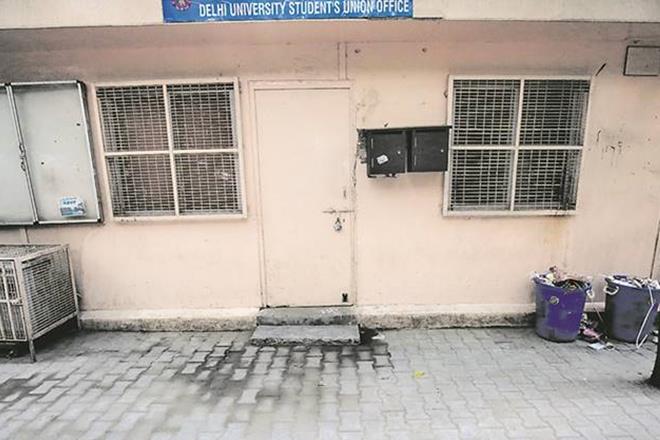


The Delhi High Court has stopped the counting of votes for the Delhi University Students' Union (DUSU) elections due to the "defacement" of public property by candidates. The court has directed the university to reimburse the costs incurred in removing the defacement and called for a stricter implementation of the Lyngdoh Committee's guidelines on election spending for student organizations. The decision has sparked a reaction from the Sangh-backed ABVP, who view it as an attack on student democracy.
Delhi University Students' Union Elections: High Court Halts Vote Counting Amid Defacement Allegations
The Delhi High Court has intervened in the ongoing Delhi University Students' Union (DUSU) elections, halting the counting of votes due to concerns over the rampant "defacement" of public property by candidates. The court has ordered the university to bear the costs of removing the defacement and has called for stricter enforcement of guidelines on election spending by student organizations.
Background
The DUSU elections have long been mired in controversy, with allegations of rampant electioneering and violations of campaign finance rules. In the latest development, some candidates were accused of defacing public walls and billboards with posters and banners, prompting a petition to the High Court.
High Court Ruling
Taking cognizance of the petition, the Delhi High Court ruled that the "unregulated and unchecked" election campaign had led to "defacement of public property on a large scale." The court directed the university to take immediate steps to clean up the defaced areas and directed the candidates responsible for the damage to bear the costs.
ABVP Reaction
The ruling has sparked a strong reaction from the Akhil Bharatiya Vidyarthi Parishad (ABVP), a student organization affiliated with the ruling Bharatiya Janata Party (BJP). The ABVP has denounced the court's decision as "an attack on student democracy" and has alleged that it is aimed at "suppressing the voices" of students.
FAQs
1. Why did the High Court halt the vote counting in the DUSU elections?
The court halted the vote counting due to the alleged "defacement" of public property by candidates.
2. What guidelines did the court direct the university to implement more strictly?
The court directed the university to strictly implement the Lyngdoh Committee's guidelines on election spending for student organizations.
3. Who is responsible for bearing the costs of removing the defacement?
The court has directed the candidates who defaced public property to bear the costs.
4. What is the ABVP's reaction to the ruling?
The ABVP has denounced the court's ruling as "an attack on student democracy."
5. What are the long-term implications of the court's ruling?
The court's ruling may lead to stricter enforcement of campaign finance rules in student elections and could discourage candidates from engaging in unethical campaigning practices.

The Goa government, under CM Pramod Sawant, has granted two district magistrates the power to invoke the National Security Act for a period of three months. The move comes after a spate of incidents involving organised crime in the state and the police's request for preventive arrest powers. This decision is likely to spark controversy as the NSA allows for detention without formal charges or trial for up to 12 months.

Prime Minister Narendra Modi continues to campaign in Bihar, warning voters of the potential dangers of an opposition alliance led by the RJD and the Congress. He claims that the people fear a 'katta raj' (the rule of guns) if this alliance wins the upcoming state election. Modi also criticizes the RJD's campaign tactics, stating that they are promoting violence and crime. He urges the people to choose the NDA regime instead, which he says will promote development and progress rather than violence.

Amid the ongoing Special Intensive Revision campaign by the Election Commission in Goa, schools and colleges are facing severe disruptions in their operations due to the deployment of crucial administrative and support staff for voter verification duties. This move has left educational institutions struggling with a severe manpower shortage, affecting day-to-day academic and administrative operations. Manpower crisis intensified as the Education Department refused to issue approvals for hiring temporary replacements, signaling a potential administrative paralysis in the state's education system.

Union Parliamentary Affairs Minister Kiren Rijiju has announced that the Winter Session of Parliament will be held from December 1 to 19, 2025, after receiving approval from President Droupadi Murmu. Rijiju expressed hope for a constructive and meaningful session that will serve the aspirations of the people and strengthen democracy. This session will be an important opportunity for the government to address key issues and concerns of the citizens.

Prime Minister Narendra Modi launched four new Vande Bharat Express trains, including the fastest one on the Banaras-Khajuraho route. The train, operated by the Northern Railway, will cover 443 km in 7.40 hours with seven AC chair cars and one executive AC char car. The route connects important pilgrimage and heritage towns, and will also stop at other religious and cultural destinations.

Indian security forces successfully thwarted a possible infiltration attempt by terrorists in Jammu and Kashmir's Kupwara district. The encounter, which took place in the Keran sector, resulted in the elimination of two terrorists. The joint operation, launched on November 7, was based on intelligence inputs and is still ongoing as search operations continue. The Chinar Corps has issued a statement confirming the development and urging readers to refrain from making any derogatory comments in response.

Prime Minister Narendra Modi launched the much-awaited Ernakulam South–Bengaluru Vande Bharat Express via video conferencing from Varanasi. The train, with eight coaches and 600 seats, will cover the journey in 8 hours and 40 minutes with nine scheduled stops. The service, which will begin on November 11, was attended by prominent political figures and media personnel. Three other Vande Bharat services were also inaugurated alongside this launch.

In a strong criticism against the Karnataka government's proposed Tunnel Road Project, BJP MP Tejasvi Surya raised concerns over the lack of feasibility and traffic study. He urged the government to prioritize public transport and complete pending projects before launching new ones. Referring to road fatalities and pedestrian deaths in Bangalore, he emphasized the need for better coordination among departments and efficient use of public funds.

Prime Minister Narendra Modi accused the Congress party of sowing the seeds of division through the omission of important stanzas from the national song Vande Mataram in 1937. Speaking at an event to commemorate 150 years of Vande Mataram, Modi highlighted the importance of the song in India's struggle for independence and its relevance in every era. He also invoked Bankim Chandra Chattopadhyay's vision of a prosperous India and praised the country's resilience against foreign invasions and colonial policies.

In a speech at a BJP office event celebrating the 150th anniversary of Vande Mataram, Chief Minister Mohan Yadav accused the Congress of linking the patriotic song to religion and causing the partition of India. Yadav argued that the song symbolises three Hindu goddesses and that Prime Minister Narendra Modi has given it a new form. However, the Congress did not participate in any events for the occasion.